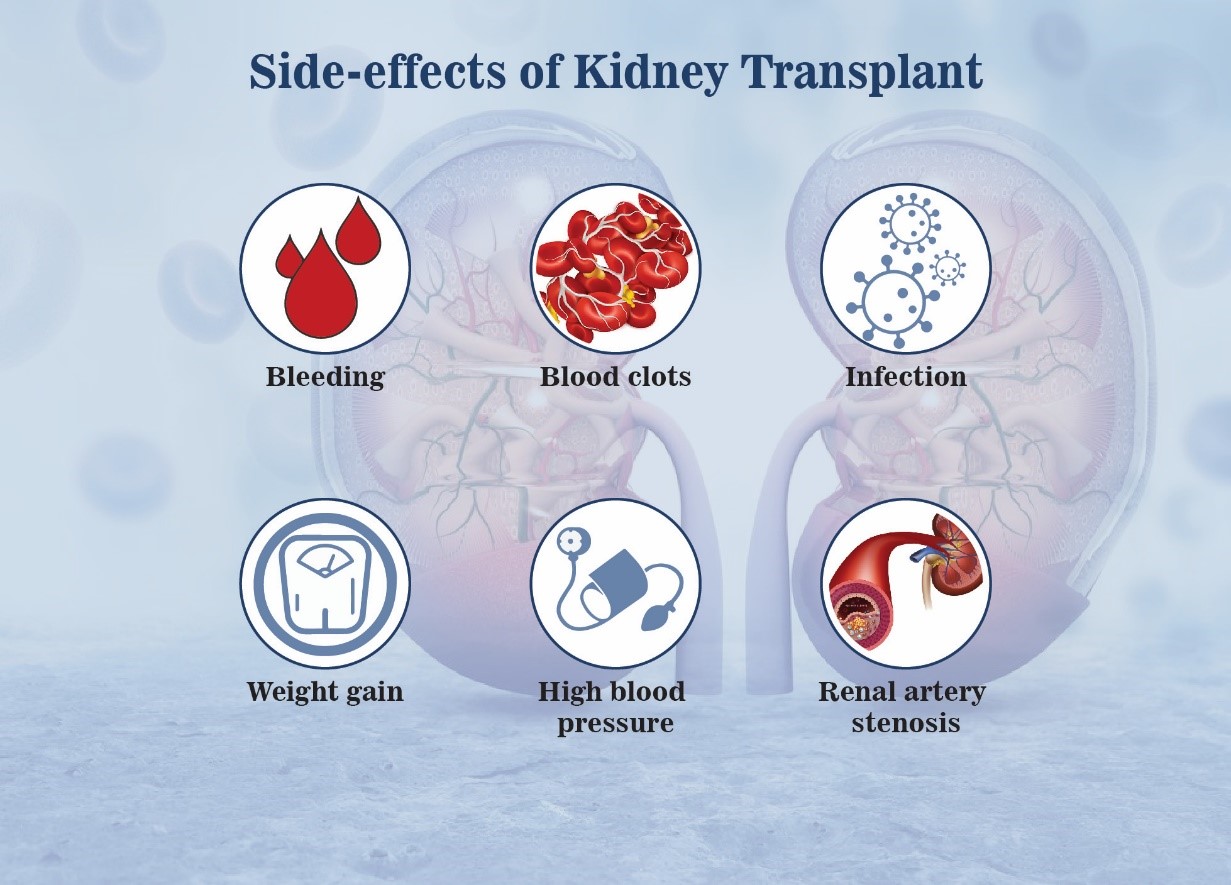Frequently Asked Questions
(FAQs)
What is a kidney transplant?
The kidneys are essential organs in our bodies that carry out several tasks including
eliminating waste from the body, controlling blood pressure, maintaining acid-base
balance, controlling fluid balance, producing different hormones, and more. A kidney
transplant is necessary when the kidneys can no longer carry out these tasks. A kidney
transplant is a surgical procedure wherein a healthy donor kidney is removed and
implanted into an individual whose kidneys are failing. Live donor kidney transplants
and kidney transplants from deceased donors are the two types of transplant options
available. As the name implies, a deceased donor's kidneys are used in kidney
transplants, and their kidneys usually survive for eight to twelve years. A kidney from
a living donor comes from a living person who chooses to donate one of their two
healthy kidneys to a person in need. The typical lifespan of kidneys from a living
donor is 15 to 20 years.
How does it work?
Before Kidney Transplant:
It's important to check whether a donor kidney will be the right fit for you before a
kidney transplant. The following tests can help with this assessment:
During the Kidney Transplant:
General anesthesia is used for doing kidney transplants. The newly
placed kidney is
inserted into the body by the surgeon through a lower abdominal incision. The blood
vessels in the lower abdomen, directly above one of your legs, are where the blood
vessels of your new kidneys are connected. The tube that connects the kidney to the
bladder, known as the ureter, is attached to the new kidney.
After the Kidney Transplant:
Following a kidney transplant, one should anticipate:
Your new kidney will filter your blood after a successful kidney
transplant, so you
won't require dialysis.
What happens to your body after a kidney transplant?
Following a successful kidney transplant, the recipient's body
experiences several
changes as it adapts to the new kidney. Moreover, specific drugs are required to avoid
renal rejection. The following are some of the changes that occur in the body
following a kidney transplant:
- Recovery and
Healing: The
patient may first feel pain, soreness, weakness, and
exhaustion in the side and abdomen areas following the procedure. Usually, a few
days to a week are spent in the hospital throughout the healing process.
The procedure is facilitated by the close monitoring and all-encompassing approach
to
patient care provided by Dr. Vijay Patel, the best Kidney Specialist in
Mumbai,
whose primary goal is to improve the quality of life for patients suffering from
renal
diseases.
- Better kidney
function: The new kidney might begin to function immediately, giving
the person more energy and enabling them to resume their regular work schedule.
- Immunosuppressive
Drugs: As a result of the kidney transplant, there is a possibility
that your body will reject the new kidney, thus you must take immunosuppressive
drugs daily. They function by impairing immunological function, which stops the
kidney from being attacked.
- Long-term
care: Recipients must maintain a healthy lifestyle that includes a
balanced diet, regular exercise, and weight control to guarantee the
transplant's
effectiveness. Frequent monitoring and follow-up consultations are necessary to
identify any early indications of rejection or problems.
How much is the cost of a kidney transplant?
A clear cost breakdown is given to patients by Dr. Vijay Patel and
his staff, who
strongly emphasize delivering value via superior, individualized care so that they
don’t have to worry about unexplained expenses that can occur during the procedure.
The cost of a kidney transplant varies significantly based on several factors, including
the country, the hospital, the intricacy of the case, and the status of the deceased or
living donor. In India, a kidney transplant typically costs between Rs 5 lakh and Rs 15
lakhs. Pre-transplant assessments, surgery, hospital stays, post-transplant care, and
prescription drugs are all included under this. Insurance coverage might lessen these
expenses.
How safe is a kidney transplant?
A kidney transplant is a difficult medical operation with possible
side effects. For
those with chronic renal failure, it is widely regarded as the safest and most effective
course of treatment. Similar to any other major operation, there are a few risks
involved, such as:

